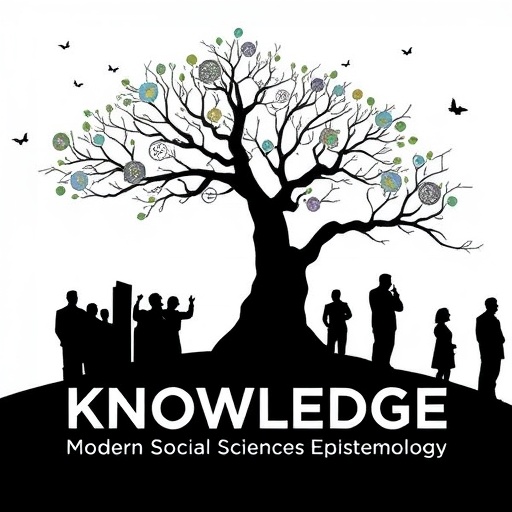In the evolving landscape of contemporary social sciences and humanities, the quest to refine epistemological frameworks has reached a critical juncture. The recent study by H. Cai, published in the International Journal of Anthropology and Ethnology, presents an innovative examination of epistemology within these disciplines, offering new insights that challenge traditional boundaries and propose a transformative perspective. This comprehensive work not only interrogates the foundational theories underpinning knowledge production but also integrates emerging methodologies, thus setting a pivotal discourse for future scholarly inquiry.
Epistemology—the branch of philosophy concerned with the nature, scope, and limits of knowledge—has traditionally been rooted in natural sciences, where empirical validation serves as the primary benchmark. However, Cai’s analysis underscores the unique challenges posed by social sciences and humanities, where subjectivity, cultural context, and interpretative frameworks often complicate the conventional epistemic paradigms. The study argues that these fields necessitate a distinct epistemological approach, one capable of accommodating multidimensional and often non-quantifiable phenomena.
Central to Cai’s argument is the critique of positivism, which historically dominated social science methodologies. While positivism advocates for objectivity and replicability akin to the natural sciences, the paper illustrates its limitations in addressing the subtleties of human experience and societal dynamics. Cai advocates for a post-positivist epistemology that embraces reflexivity, acknowledges researcher positionality, and recognizes the constructed nature of social realities.
Furthermore, the research delves into the role of interdisciplinarity, asserting that contemporary social sciences and humanities thrive at the intersections of diverse academic traditions. By synthesizing approaches from anthropology, ethnology, sociology, and philosophy, Cai delineates a more holistic epistemic model. This model not only enriches understanding but also enhances the explanatory power of social phenomena by integrating qualitative and quantitative insights.
Technological advancements also constitute a significant theme in the study. Cai explores how digital tools, big data analytics, and artificial intelligence are reshaping epistemological processes. The incorporation of these technologies facilitates novel forms of data collection and analysis, yet also raises critical questions about algorithmic biases, data privacy, and ethical considerations. The paper urges scholars to navigate these complexities with epistemological rigor, ensuring that technological integration enhances rather than distorts the knowledge production process.
The investigation further emphasizes the importance of epistemic pluralism, encouraging an openness to multiple ways of knowing. This approach not only democratizes knowledge but also challenges hegemonic epistemic authorities, particularly those grounded in Western intellectual traditions. Cai highlights the significance of indigenous knowledge systems, feminist epistemologies, and other marginalized voices, suggesting that their inclusion enriches academic discourse and produces more socially just knowledge outcomes.
In addressing the reproducibility crisis that pervades many academic disciplines, the article underscores that reproducibility in social sciences and humanities must be reconceptualized. Unlike experimental sciences, these fields operate within contexts that are fluid, historically contingent, and deeply embedded in cultural narratives. Cai proposes new criteria for assessing the validity and reliability of research that move beyond mere replicability to encompass contextual robustness and interpretative fidelity.
The paper also scrutinizes the pedagogical implications of these epistemological shifts. Cai argues for an educational overhaul in social sciences and humanities curricula, incorporating critical epistemology as a core component. Such reform aims to equip emerging scholars with the skills to critically assess knowledge claims, deconstruct dominant narratives, and engage ethically with diverse epistemic communities.
Moreover, Cai’s research probes into the political dimensions of epistemology, detailing how knowledge production is inextricably linked to power structures. The study reveals that epistemic practices often reflect and reinforce social inequalities, and calls for a deliberate politicization of epistemology that challenges entrenched hierarchies and advocates for epistemic justice. This transformative agenda demands vigilance against epistemic violence and promotes accountability within scholarly practices.
The methodological rigor of the study is notable, integrating historical analysis, case studies, and theoretical synthesis to construct a robust epistemological framework. Cai’s nuanced engagement with both classical and contemporary thinkers situates the research within a rich intellectual tradition while pushing the boundaries toward innovative paradigms. This approach underscores the dynamic interplay between theory and praxis in understanding social realities.
An essential contribution of the paper lies in its articulation of epistemic responsibility. Cai posits that scholars bear a duty not only to pursue truth but also to consider the societal ramifications of their knowledge. This ethical imperative resonates most strongly in fields like anthropology and ethnology, where research outcomes can impact communities and cultural preservation profoundly.
The study also explores the potential of collaborative epistemologies, advocating for participatory research models that involve communities as active knowledge producers rather than passive subjects. Such models foster mutual respect, enhance data authenticity, and promote epistemic humility—recognizing the limitations inherent in any single perspective.
Cai’s epistemological inquiry is particularly timely in an era marked by information overload, misinformation, and deepening social polarization. The call for rigorous, context-sensitive, and ethically grounded knowledge production offers a pathway to counteract fragmentation and foster more coherent and inclusive social narratives.
In conclusion, the article by H. Cai represents a seminal contribution to the epistemology of contemporary social sciences and humanities. It challenges existing orthodoxies, introduces critical innovations, and charts new directions for epistemological thought and practice. By intertwining technical sophistication with profound ethical considerations, this research promises to galvanize scholars, educators, and policymakers alike, aiming to cultivate a more reflective and responsive intellectual landscape.
Subject of Research:
The epistemological foundations and methodological innovations in contemporary social sciences and humanities.
Article Title:
The epistemology of contemporary social sciences and humanities.
Article References:
Cai, H. The epistemology of contemporary social sciences and humanities. Int. j. anthropol. ethnol. 9, 12 (2025). https://doi.org/10.1186/s41257-025-00135-9
Image Credits: AI Generated
DOI: 30 June 2025




